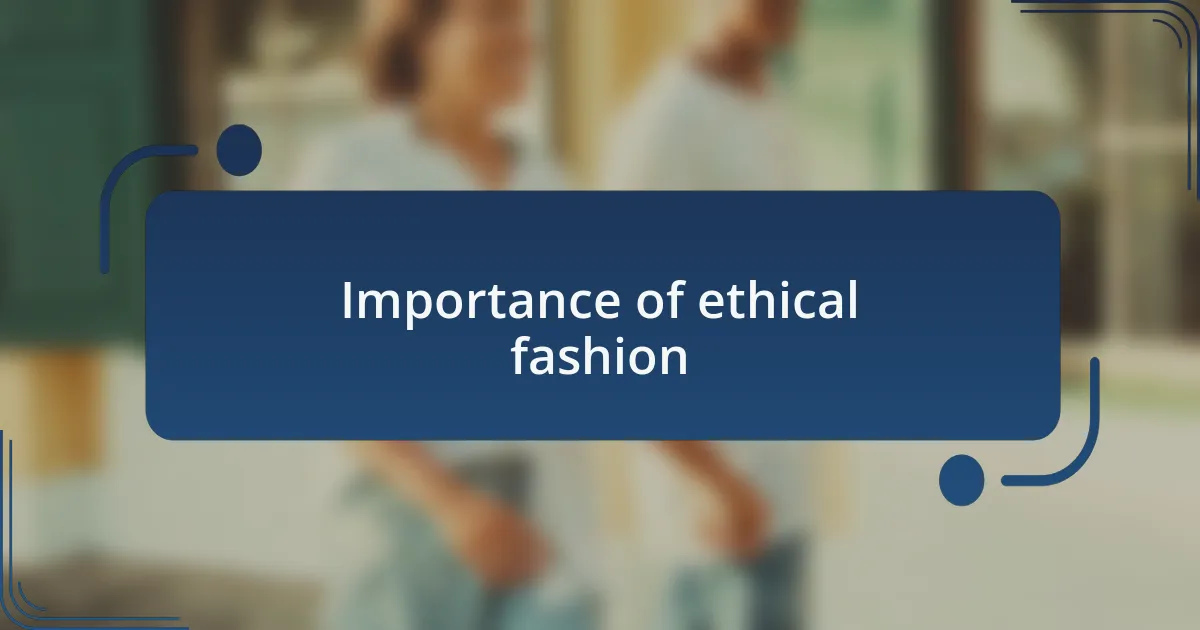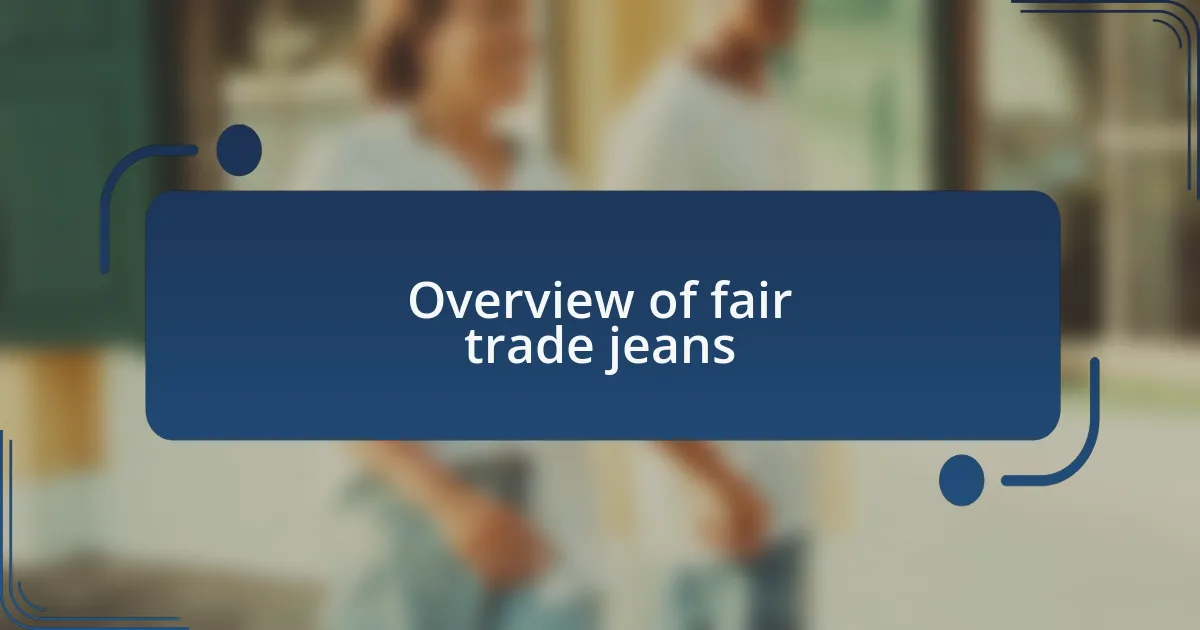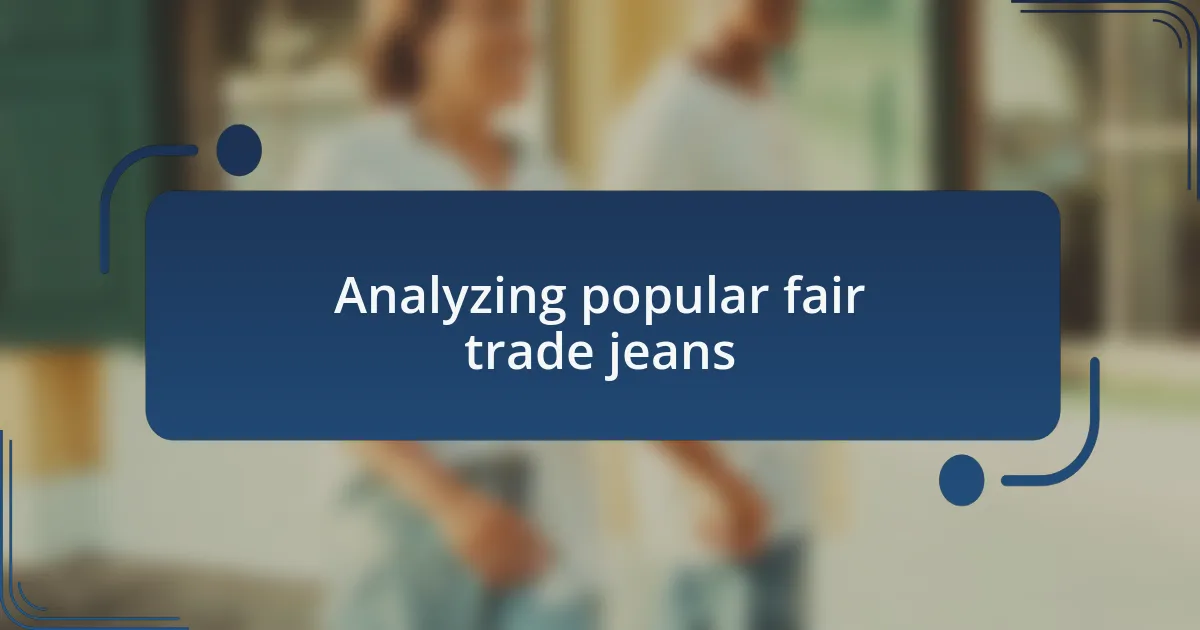Key takeaways:
- Fair trade practices promote equitable relationships between producers and consumers, emphasizing transparency, sustainability, and improved working conditions.
- Ethical fashion connects consumers to the lives of artisans, showcasing how purchasing decisions can support education and break the cycle of poverty.
- Fair trade jeans reflect responsible sourcing, fair wages, and environmental stewardship, allowing consumers to align their values with their purchases.
- Brands that prioritize transparency in their supply chains empower consumers to make informed choices that contribute to community upliftment and sustainable practices.

Understanding fair trade practices
Fair trade practices center around creating equitable relationships between producers and consumers, particularly in developing countries. I remember visiting a small workshop where artisans crafted handmade goods; seeing their pride in their work highlighted how crucial fair compensation is. It makes you wonder, doesn’t it? What if every product we bought directly supported the people who created it?
The principles of fair trade emphasize transparency, sustainability, and improved working conditions. I was struck by a conversation with a denim manufacturer who shared how fair trade practices transformed their community. This connection between ethical sourcing and community upliftment is often overlooked. Have you thought about how the simple act of choosing fair trade can ripple out to create real change?
Moreover, fair trade isn’t just a label; it’s a commitment to ethical production and environmental stewardship. I recall exploring a brand that emphasized responsible sourcing, proving that consumer choices can indeed lead to a more sustainable future. Isn’t it empowering to think that our purchasing power can contribute to a more just world? Understanding these practices deepens our appreciation for the craftsmanship behind our favorite jeans.

Importance of ethical fashion
Ethical fashion stands at the crossroads of responsibility and creativity. I once attended a fashion show where the focus was on sustainable designs. The energy in that room was electric as each model walked, showcasing not just clothes but stories of artisans who poured their souls into every stitch. It struck me how vital it is for consumers to understand that their choices can uplift entire communities.
When I think about the impact of my purchasing decisions, I often reflect on a visit to a fair trade cooperative. There, I met a mother who shared how ethical fashion directly supported her children’s education. This simple yet profound connection made me realize that every pair of jeans could represent a step towards breaking the cycle of poverty. How often do we think about the lives intertwined with our clothing?
The importance of ethical fashion goes beyond aesthetics; it fosters a culture of accountability. I remember discussing the shift in consumer attitudes with a designer who champions fair practices. They expressed hope that as more people became aware of ethical issues in fashion, the demand for responsible manufacturing would grow. Isn’t it heartening to imagine a future where fashion doesn’t just look good but feels good too?

Overview of fair trade jeans
Fair trade jeans symbolize a commitment to responsible sourcing and labor practices in the denim industry. I recall visiting a small fair trade workshop, where artisans proudly showed me the meticulous process behind each pair. Seeing their craftsmanship firsthand made me appreciate that a pair of jeans is not just fabric stitched together; it embodies the livelihood of these skilled workers.
The unique aspect of fair trade jeans lies in their pricing, which reflects the true cost of ethical production. I once purchased a pair from a fair trade brand and discovered the bonus of knowing that my purchase helped provide fair wages and safe working conditions. How often do we stop to consider the stories behind the labels on our clothing?
Furthermore, fair trade jeans contribute to a more sustainable planet by minimizing environmental impact. I learned that these practices go hand in hand with eco-friendly materials and processes, all while keeping communities intact. Isn’t it inspiring to think that by choosing fair trade jeans, we can wear our values with pride while promoting positive change in the fashion world?

Analyzing popular fair trade jeans
When analyzing popular fair trade jeans, I often find it fascinating how each brand carries a unique narrative shaped by their commitment to ethical practices. For instance, I remember trying on a pair from a well-known fair trade label that not only fit me perfectly but also bore the story of the artisans behind them. This feeling is something no conventional fast-fashion purchase can replicate; it’s like wearing a piece of history through socially responsible choices.
What I’ve noticed is that many fair trade jeans brands prioritize transparency in their supply chains. A recent study revealed that consumers are becoming increasingly aware of where their clothes come from, and I couldn’t agree more. When I see detailed information about labor practices and environmental impact on a brand’s website, it reinforces my belief in the importance of informed consumerism. Isn’t it empowering to know that a single decision can help uplift entire communities?
Additionally, the range of styles and fits available has come a long way, catering to a diverse audience. While shopping for jeans, I stumbled upon a brand that offered both trendy cuts and classic styles, all while adhering to fair trade standards. It made me reflect on how ethical fashion has evolved; now, we don’t need to compromise on style for the sake of our values. Plus, how rewarding is it to step out in jeans that not only look good but also do good?